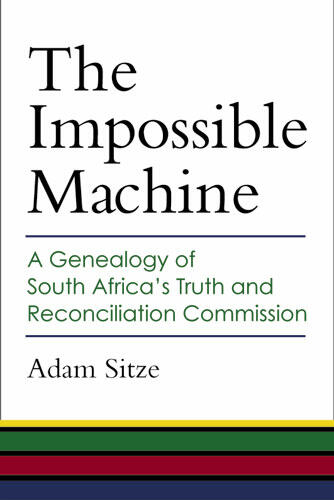The Impossible Machine
A Genealogy of South Africa’s Truth and Reconciliation Commission
A fresh, though counterintuitive, understanding of South Africa’s Truth and Reconciliation Commission’s legal, political, and cultural heritage
Description
Adam Sitze meticulously traces the origins of South Africa’s Truth and Reconciliation Commission back to two well-established instruments of colonial and imperial governance: the jurisprudence of indemnity and the commission of inquiry. This genealogy provides a fresh, though counterintuitive, understanding of the TRC’s legal, political, and cultural importance. The TRC’s genius, Sitze contends, is not the substitution of “forgiving” restorative justice for “strict” legal justice but rather the innovative adaptation of colonial law, sovereignty, and government. However, this approach also contains a potential liability: if the TRC’s origins are forgotten, the very enterprise intended to overturn the jurisprudence of colonial rule may perpetuate it. In sum, Sitze proposes a provocative new means by which South Africa’s Truth and Reconciliation Commission should be understood and evaluated.
Adam Sitze is Associate Professor of Law, Jurisprudence, and Social Thought at Amherst College.
Reviews
“Beautifully written and engaging to read . . . the book will be a significant contribution to the corpus of political, legal, and philosophical work on transitional justice and postcolonial justice more generally, will have a wide audience and is likely to reshape the field of transitional and postcolonial justice studies.”
—Fiona Ross, University of Cape Town
“[Sitze] makes an invaluable contribution to our understanding of the origins and historical location of the South African TRC and poses important questions to both scholars of transitional justice as well as scholars and practitioners of South African law and legal history.”
—Heinz Klug, University of Wisconsin Law School
“This meticulously documented work . . . traces the legal and philosophical roots of South Africa’s groundbreaking Truth and Reconciliation Commission. Sitze brings to light the extent to which the commission must be seen as drawing upon past legal precedent within both the context of South Africa and the broader jurisprudence of Europe.”
—Christopher W. Herrick, Muhlenberg College, in Choice
"This meticulously documented work with nearly 100 pages of footnotes traces the legal and philosophical roots of South Africa's groundbreaking Truth and Reconciliation Commission. Sitze (law, jurisprudence, and social thought, Amherst College) brings to light the extent to which the commission must be seen as drawing upon past legal precedent within both the context of South Africa and the broader jurisprudence of Europe."--Choice
- C. W. Herrick
News, Reviews, Interviews
Interview | Connecting Point

